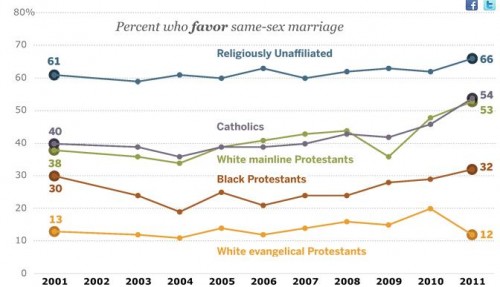Sociologists use the term “androcentrism” to refer to a new kind of sexism, one that replaces the favoring of men over women with the favoring of masculinity over femininity. According to the rules of androcentrism, men and women alike are rewarded, but only insofar as they are masculine (e.g., they play sports, drink whiskey, and are lawyers or surgeons w00t!). Meanwhile, men are punished for doing femininity and women… well, women are required to do femininity and simultaneously punished for it.
Illustrating this concept, much more concisely, is this altered photograph of James Franco in drag. Sent along by Stephanie V., the photo was originally for the cover of Candy, a “transversal style” fashion magazine. I’m not sure who added the copy,* but I like it:
* So Caro Visi, where I found the image, credits Virus, but I can’t find it there. I’m happy to properly credit if someone can point me in the right direction.
UPDATE: Sarah and John, in the comments thread, pointed out that the language is borrowed from a movie titled The Cement Garden. Jennifer points out that Madonna used it, as well, in her song What it Feels Like For A Girl.
Clip from The Cement Garden:
More posts on androcentrism: “woman” as an insult, making it manly: how to sell a car, good god don’t let men wear make up or long hair, don’t forget to hug like a dude, saving men from their (feminine) selves, men must eschew femininity, not impressed with Buzz Lightyear commercial, dinosaurs can’t be for girls, and sissy men are so uncool.
Lisa Wade, PhD is an Associate Professor at Tulane University. She is the author of American Hookup, a book about college sexual culture; a textbook about gender; and a forthcoming introductory text: Terrible Magnificent Sociology. You can follow her on Twitter and Instagram.














